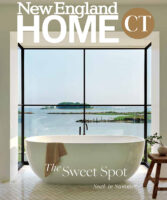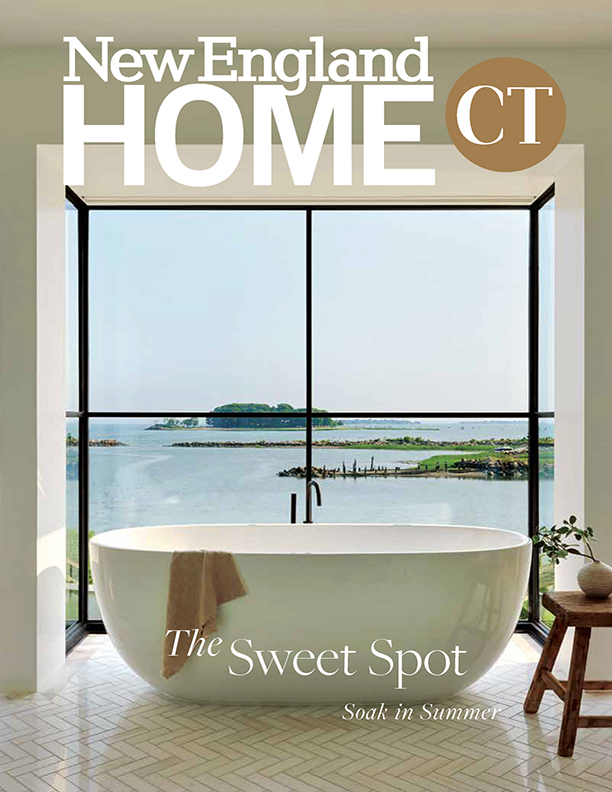
Song of the Sea
MODERN COASTAL LIVING IN CONNECTICUT
Boats, beaches and building codes inspire the design of a new coastal home.
By Gail Ravgalia
Architecture: Christopher Pagliaro Architects, Interior Design: Anastasia Interior Design, Builder: Long Neck Custom Homes, Photography: Peter Brown
Christopher Pagliaro and Tina Anastasia Team Up to Design a Connecticut Home
Designing buildings is a task that involves combining the tangible with the ephemeral. Structural requirements must meet aesthetic aspirations, and both must attend to human comfort and needs. To Christopher Pagliaro, principal of Christopher Pagliaro Architects, “The process is like words and music making a song.”
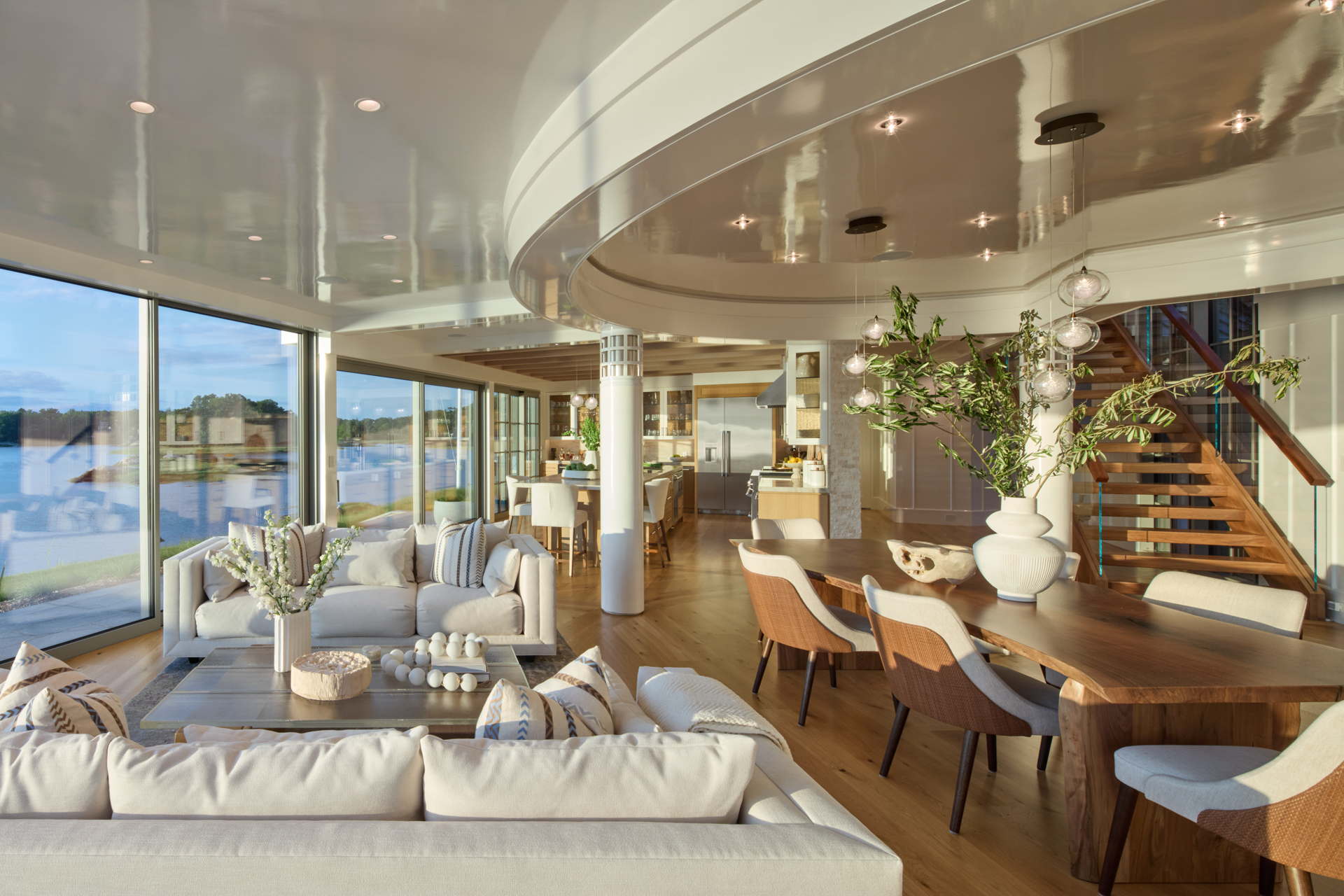
The interior of the house is reminiscent of a luxury yacht. “The idea was for the occupants to feel like they were on the water,” says interior designer Tina Anastasia. An arc in the ceiling delineates the dining and entry areas as separate from the sunroom; the glossy finish reflects the glistening sea beyond.
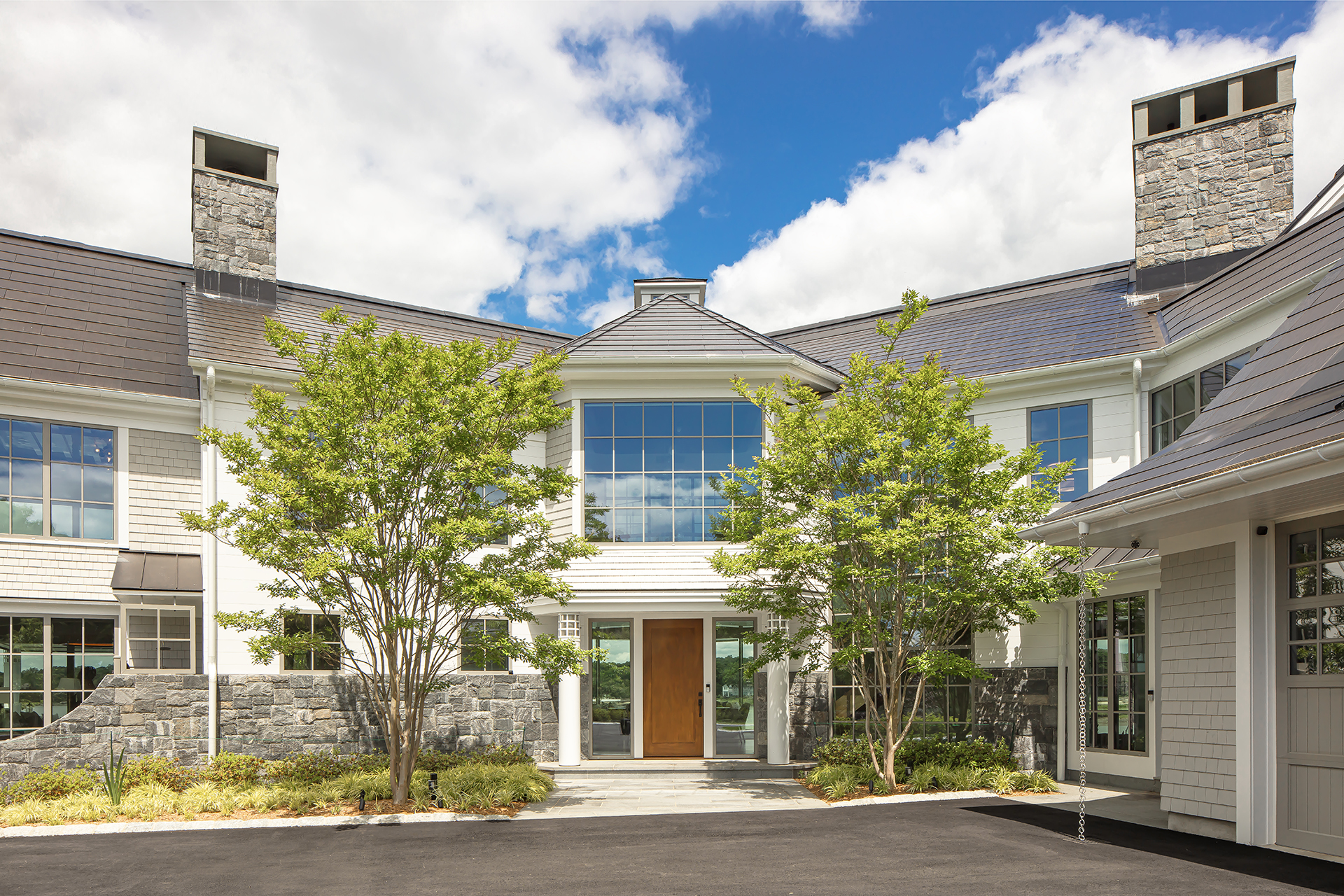
While the land-facing exterior has classic New England Shingle-style elements, the roof is covered with state-of-the-art Tesla solar shingles, which feed the home’s electric grid.
For a house he designed on the Connecticut coast, he found a like-minded cohort in Tina Anastasia of Anastasia Interior Design, whose analogy is more literary than musical. For her, design is a narrative revealed in well-constructed chapters that are bound together like a book. “Each element is just one piece that ultimately has to be about the whole story,” she says.
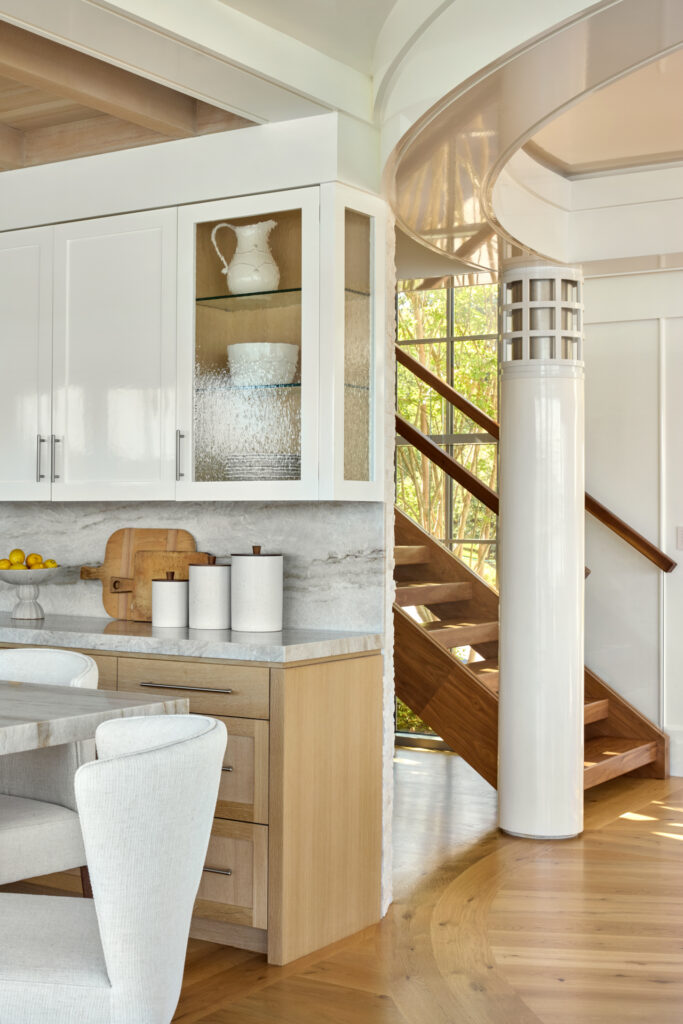
All the columns, like this one by the open staircase, are topped with a built-in LED lantern, a signature design element of Christopher Pagliaro Architects.
Designing a Waterfront Home Around the Landscape
Song or story, the project began with a remarkable site, a long arc of shoreline along a quiet saltwater cove. Initially, the homeowners, an empty-nest couple with five adult children, considered renovating and adding to the 4,500-square-foot ranch-style house where they had lived for many years. The rambling structure did not meet current setback and floodplain requirements and had some quirky idiosyncrasies such as doorways just six feet high. Cost and wish-list evaluations led them to scratch those plans in favor of building a new house that would allow them to better take full advantage of the site.
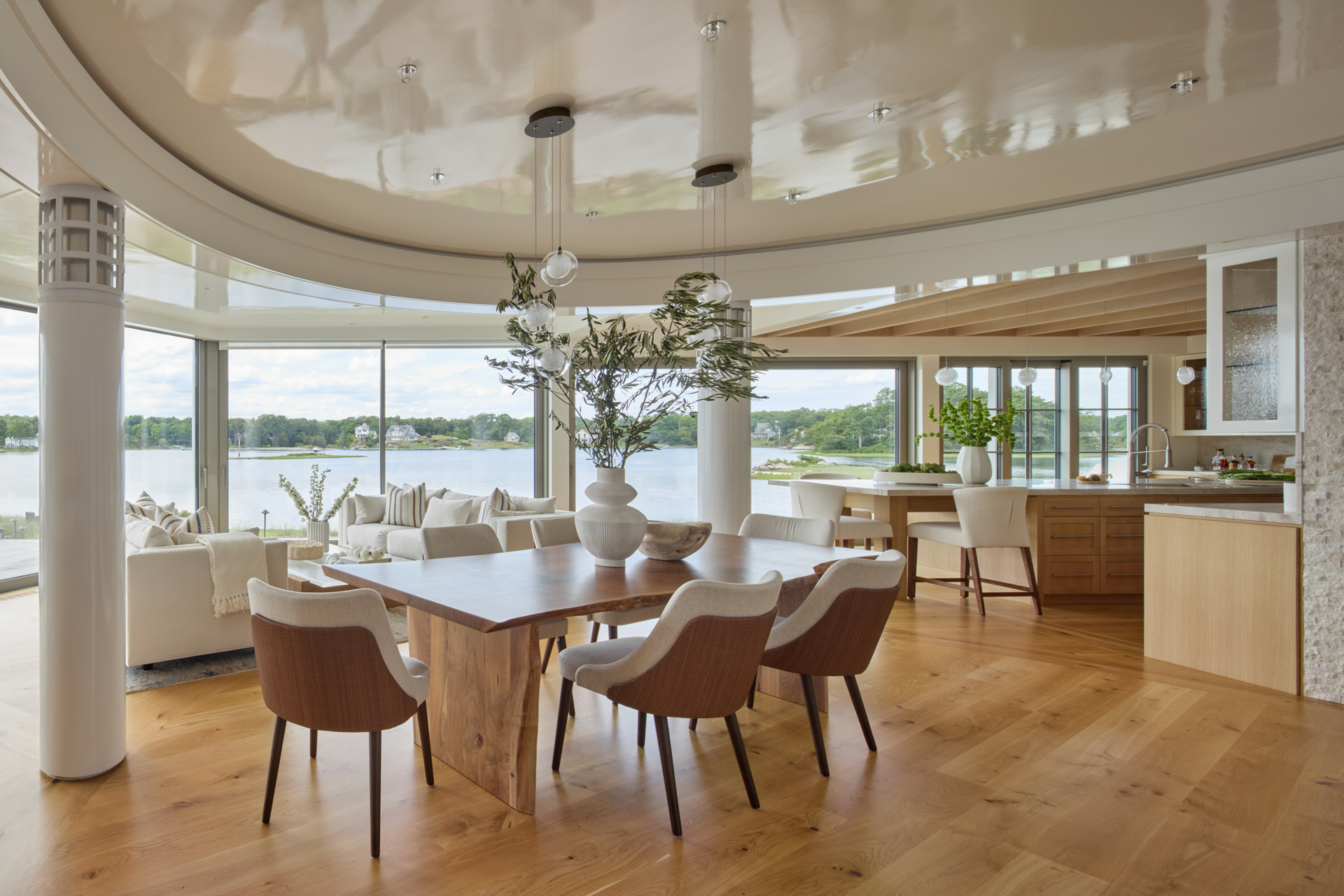
Delicate glass light fixtures dangle above the custom dining table, designed with a live edge for added texture.
“This house is a classic example of architecture that designs itself,” says Pagliaro. “It’s a simple lesson in house planning. If you track body movement on a property it dictates where things go. The result is a 6,600-square-foot V-shaped house that aligns with the contour of the waterline and is essentially one-room deep. Living spaces are on the water-facing side and utility aspects on the other, says Pagliaro.
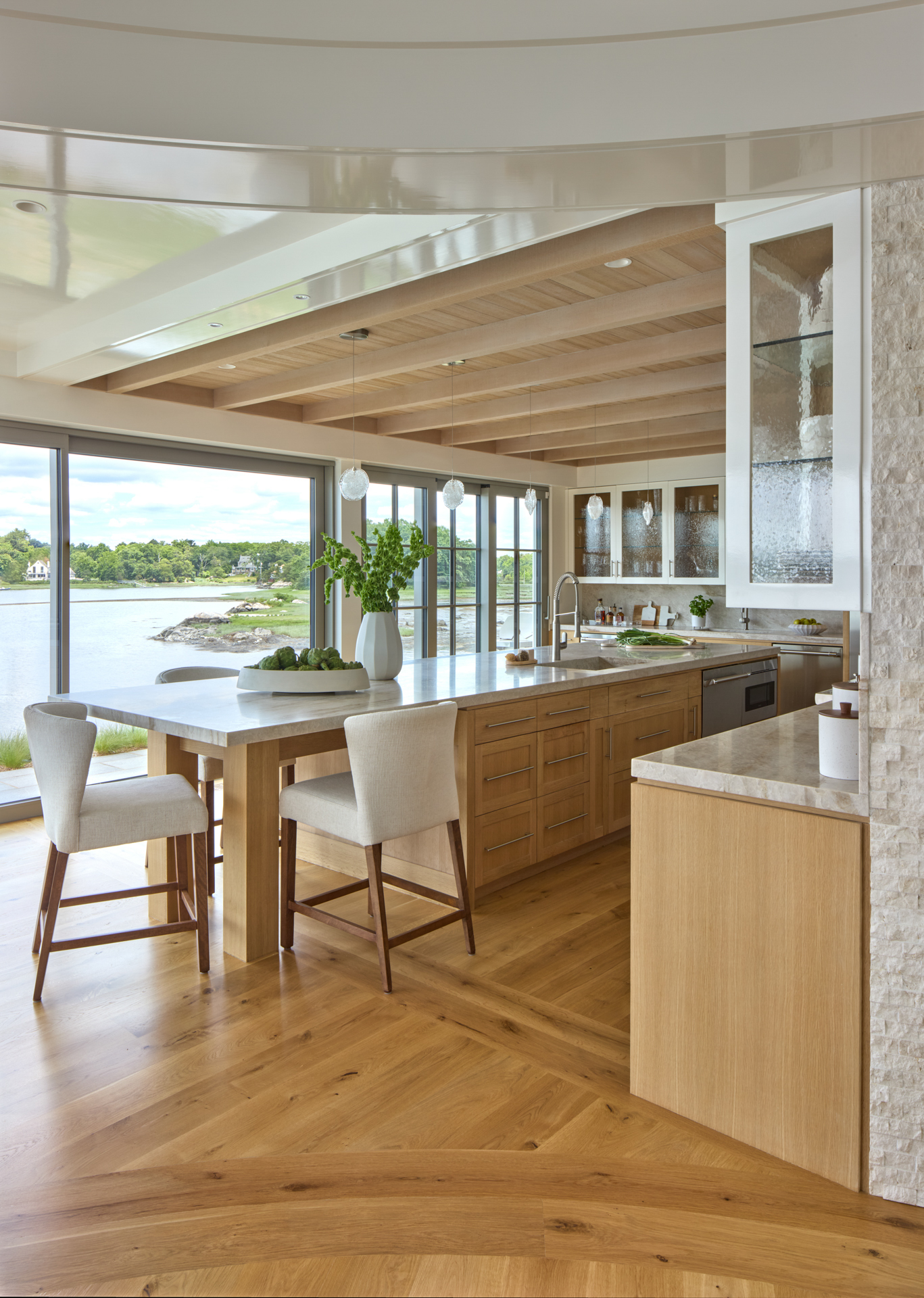
Wood cabinets, flooring, and a beamed ceiling make the kitchen an inviting place to gather and enjoy the unobstructed view (left). The clam-shaped pendants, like the lighting throughout the house, are purposely transparent. “You see them and see past them,” says Anastasia. The family room (right) and the first-floor office (below) share a two-way fireplace. Metal-framed glass pocket doors between the rooms provide privacy.
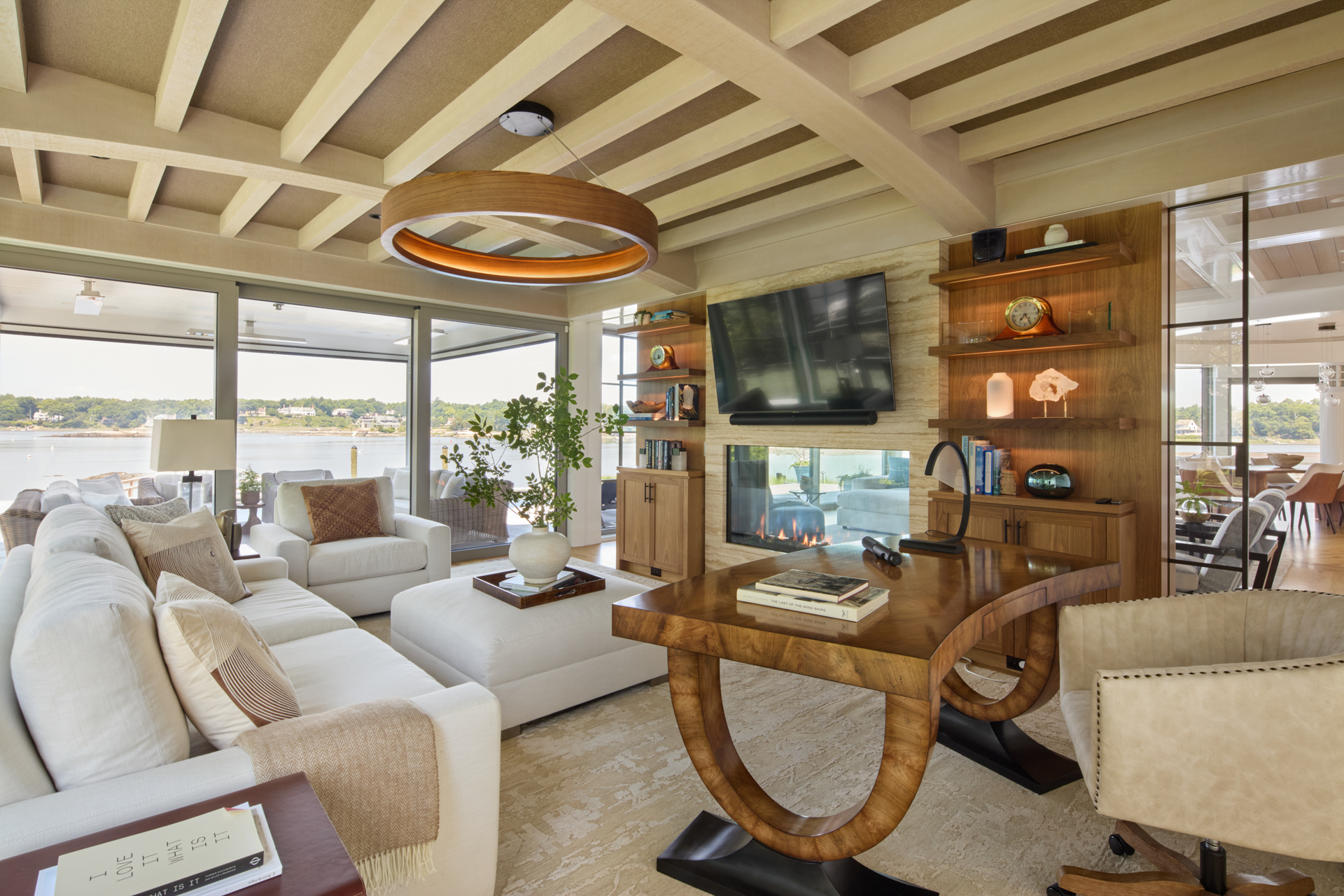
Nautical-Inspired Interiors
“It was magical to design a house with this view,” says Anastasia. Not wanting to distract from the cinematic vista of water and sky, she used warm neutral colors and textures inspired by the beach for the interiors. “When the tide goes out, it’s what is left in the sand,” she says.
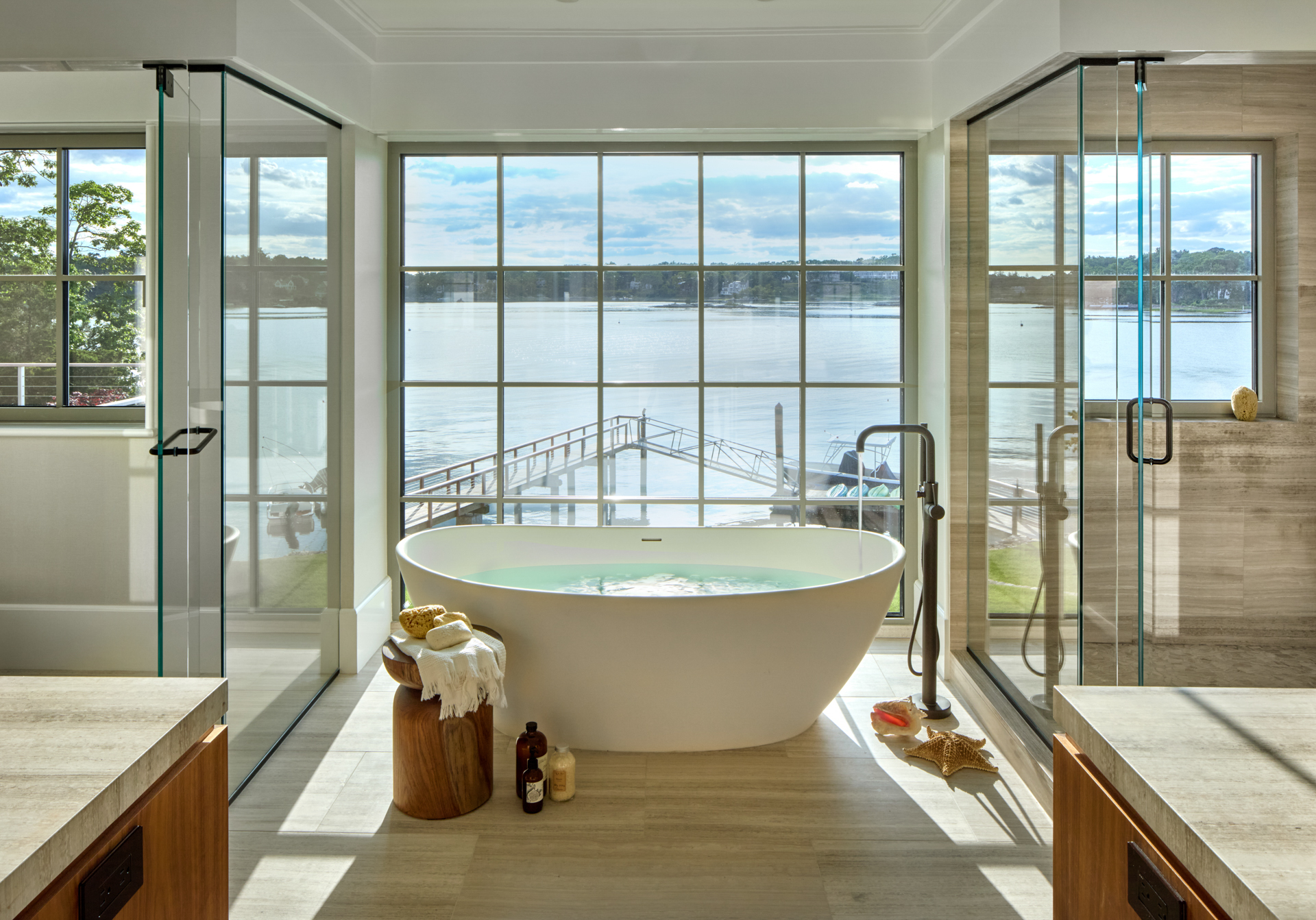
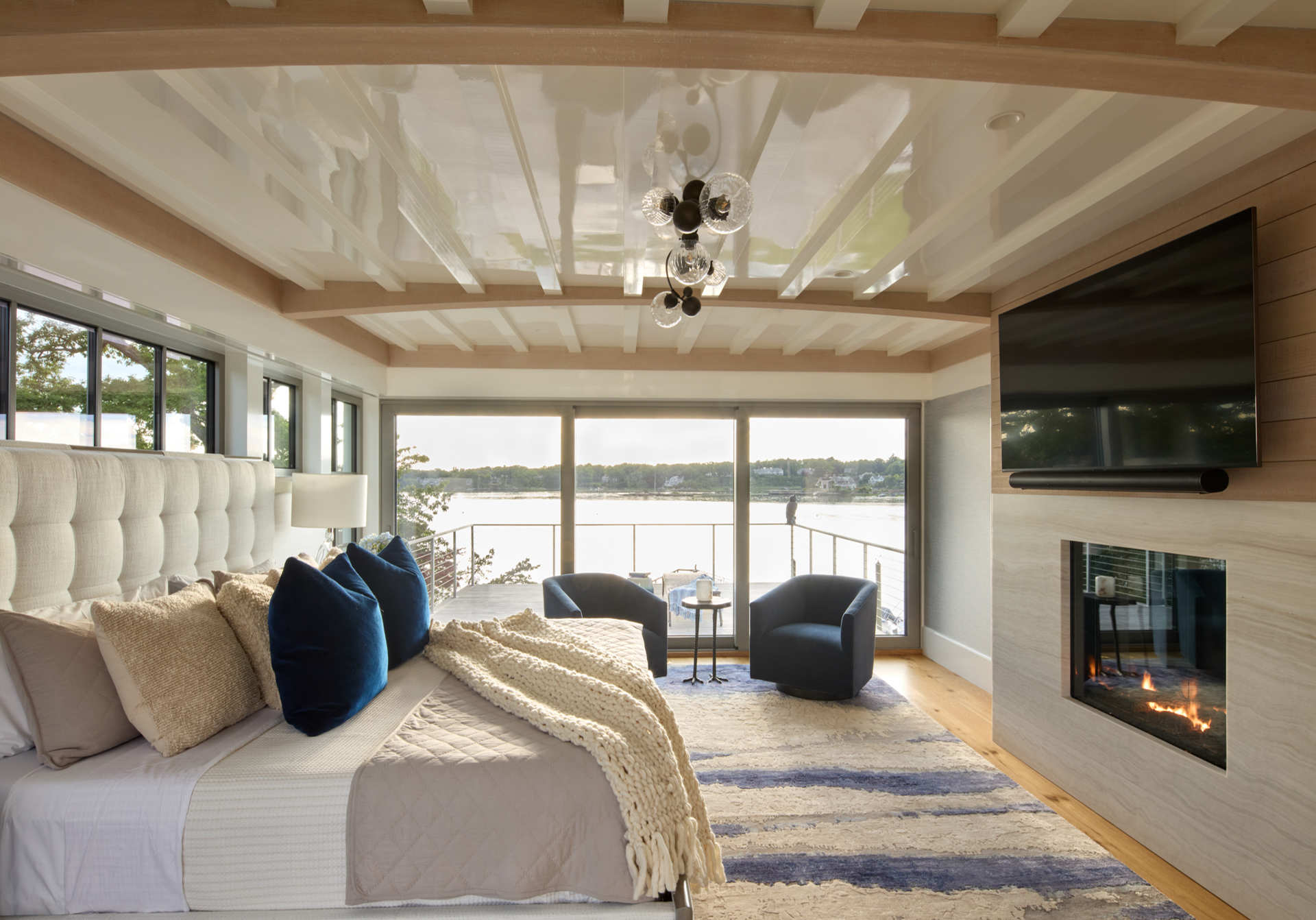
Flanked by dual walk-in showers, the soaking tub in the second-floor primary bathroom has soothing views of the boat dock and cove. The wood-framed beamed ceiling in the primary bedroom repeats the glossy finish applied to the ceilings on the main floor.
Throughout, the sensation is akin to being onboard a luxury yacht. But unlike a boat, this house has a wide-open floor plan, which Pagliaro makes cozy by varying ceiling treatments to define individual spaces. The two-story-high entry gives way to a foyer, dining area, and seating area, dubbed the sunroom, that sport a ceiling painted high-gloss white. “Layers of plaster that left waves in the finish show a craftsman’s hand,” says Pagliaro.
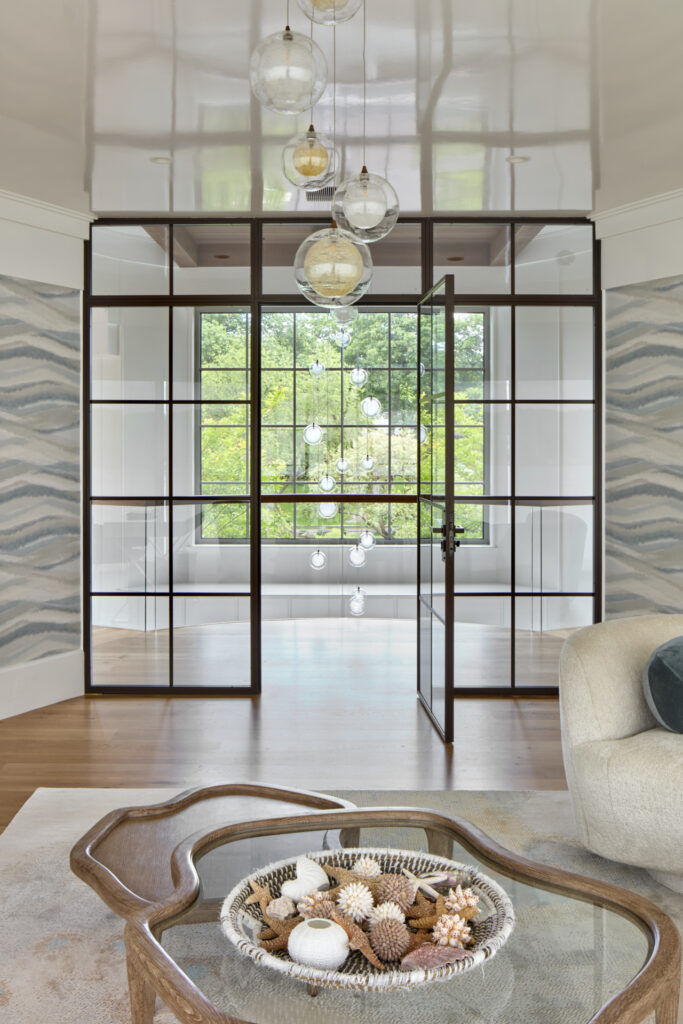
Dangling glass light fixtures in the upstairs sitting room/office and the double-height entry beyond are delicate yet dramatic.
For the kitchen, he specified a ceiling of vertical-grain Douglas fir that is sawn but not sanded so that it takes on a muted tone. “It looks like raw framing and has a coastal, salty feel,” he says.
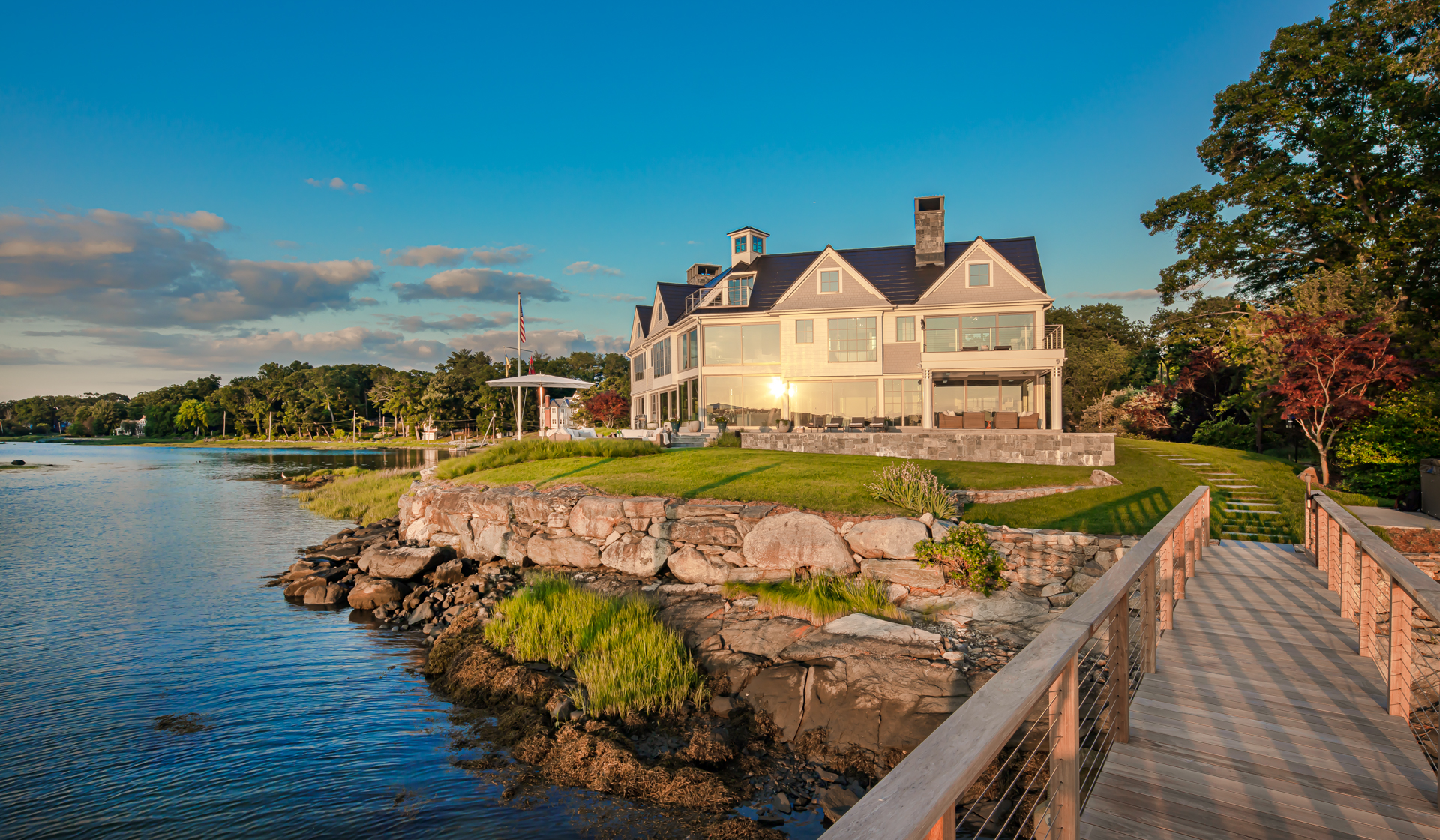
The new house takes full advantage of the waterfront site while adhering to floodplain and setback regulations, including placement of the swimming pool, marked by the open beach umbrella. “We wanted the pool to have water views, too,” says the homeowner.
It’s easy to move around the house whether for daily living or to entertain,” says the owner. “We accessed how we lived. We wanted every room to have a view. We are big boating people, and we wanted a beach feel.” All goals have been met, and, he adds, in working with this design team, “the process was pure joy.”
MODERN COASTAL LIVING IN CONNECTICUT
Boats, beaches and building codes inspire the design of a new coastal home.
By Gail Ravgalia
Architecture: Christopher Pagliaro Architects, Interior Design: Anastasia Interior Design, Builder: Long Neck Custom Homes, Photography: Peter Brown
Christopher Pagliaro and Tina Anastasia Team Up to Design a Connecticut Home
Designing buildings is a task that involves combining the tangible with the ephemeral. Structural requirements must meet aesthetic aspirations, and both must attend to human comfort and needs. To Christopher Pagliaro, principal of Christopher Pagliaro Architects, “The process is like words and music making a song.”

The interior of the house is reminiscent of a luxury yacht. “The idea was for the occupants to feel like they were on the water,” says interior designer Tina Anastasia. An arc in the ceiling delineates the dining and entry areas as separate from the sunroom; the glossy finish reflects the glistening sea beyond.

While the land-facing exterior has classic New England Shingle-style elements, the roof is covered with state-of-the-art Tesla solar shingles, which feed the home’s electric grid.
For a house he designed on the Connecticut coast, he found a like-minded cohort in Tina Anastasia of Anastasia Interior Design, whose analogy is more literary than musical. For her, design is a narrative revealed in well-constructed chapters that are bound together like a book. “Each element is just one piece that ultimately has to be about the whole story,” she says.

All the columns, like this one by the open staircase, are topped with a built-in LED lantern, a signature design element of Christopher Pagliaro Architects.
Designing a Waterfront Home Around the Landscape
Song or story, the project began with a remarkable site, a long arc of shoreline along a quiet saltwater cove. Initially, the homeowners, an empty-nest couple with five adult children, considered renovating and adding to the 4,500-square-foot ranch-style house where they had lived for many years. The rambling structure did not meet current setback and floodplain requirements and had some quirky idiosyncrasies such as doorways just six feet high. Cost and wish-list evaluations led them to scratch those plans in favor of building a new house that would allow them to better take full advantage of the site.

Delicate glass light fixtures dangle above the custom dining table, designed with a live edge for added texture.
“This house is a classic example of architecture that designs itself,” says Pagliaro. “It’s a simple lesson in house planning. If you track body movement on a property it dictates where things go. The result is a 6,600-square-foot V-shaped house that aligns with the contour of the waterline and is essentially one-room deep. Living spaces are on the water-facing side and utility aspects on the other, says Pagliaro.

Wood cabinets, flooring, and a beamed ceiling make the kitchen an inviting place to gather and enjoy the unobstructed view (left). The clam-shaped pendants, like the lighting throughout the house, are purposely transparent. “You see them and see past them,” says Anastasia. The family room (right) and the first-floor office (below) share a two-way fireplace. Metal-framed glass pocket doors between the rooms provide privacy.

Nautical-Inspired Interiors
“It was magical to design a house with this view,” says Anastasia. Not wanting to distract from the cinematic vista of water and sky, she used warm neutral colors and textures inspired by the beach for the interiors. “When the tide goes out, it’s what is left in the sand,” she says.


Flanked by dual walk-in showers, the soaking tub in the second-floor primary bathroom has soothing views of the boat dock and cove. The wood-framed beamed ceiling in the primary bedroom repeats the glossy finish applied to the ceilings on the main floor.
Throughout, the sensation is akin to being onboard a luxury yacht. But unlike a boat, this house has a wide-open floor plan, which Pagliaro makes cozy by varying ceiling treatments to define individual spaces. The two-story-high entry gives way to a foyer, dining area, and seating area, dubbed the sunroom, that sport a ceiling painted high-gloss white. “Layers of plaster that left waves in the finish show a craftsman’s hand,” says Pagliaro.

Dangling glass light fixtures in the upstairs sitting room/office and the double-height entry beyond are delicate yet dramatic.
For the kitchen, he specified a ceiling of vertical-grain Douglas fir that is sawn but not sanded so that it takes on a muted tone. “It looks like raw framing and has a coastal, salty feel,” he says.

The new house takes full advantage of the waterfront site while adhering to floodplain and setback regulations, including placement of the swimming pool, marked by the open beach umbrella. “We wanted the pool to have water views, too,” says the homeowner.
It’s easy to move around the house whether for daily living or to entertain,” says the owner. “We accessed how we lived. We wanted every room to have a view. We are big boating people, and we wanted a beach feel.” All goals have been met, and, he adds, in working with this design team, “the process was pure joy.”
MODERN COASTAL LIVING IN CONNECTICUT
Boats, beaches and building codes inspire the design of a new coastal home.
By Gail Ravgalia
Architecture: Christopher Pagliaro Architects, Interior Design: Anastasia Interior Design, Builder: Long Neck Custom Homes, Photography: Peter Brown
Designing buildings is a task that involves combining the tangible with the ephemeral. Structural requirements must meet aesthetic aspirations, and both must attend to human comfort and needs. To Christopher Pagliaro, principal of Christopher Pagliaro Architects, “The process is like words and music making a song.”

The interior of the house is reminiscent of a luxury yacht. “The idea was for the occupants to feel like they were on the water,” says interior designer Tina Anastasia. An arc in the ceiling delineates the dining and entry areas as separate from the sunroom; the glossy finish reflects the glistening sea beyond.

While the land-facing exterior has classic New England Shingle-style elements, the roof is covered with state-of-the-art Tesla solar shingles, which feed the home’s electric grid.
For a house he designed on the Connecticut coast, he found a like-minded cohort in Tina Anastasia of Anastasia Interior Design, whose analogy is more literary than musical. For her, design is a narrative revealed in well-constructed chapters that are bound together like a book. “Each element is just one piece that ultimately has to be about the whole story,” she says.

All the columns, like this one by the open staircase, are topped with a built-in LED lantern, a signature design element of Christopher Pagliaro Architects.
Designing a Waterfront Home Around the Landscape
Song or story, the project began with a remarkable site, a long arc of shoreline along a quiet saltwater cove. Initially, the homeowners, an empty-nest couple with five adult children, considered renovating and adding to the 4,500-square-foot ranch-style house where they had lived for many years. The rambling structure did not meet current setback and floodplain requirements and had some quirky idiosyncrasies such as doorways just six feet high. Cost and wish-list evaluations led them to scratch those plans in favor of building a new house that would allow them to better take full advantage of the site.

Delicate glass light fixtures dangle above the custom dining table, designed with a live edge for added texture.
“This house is a classic example of architecture that designs itself,” says Pagliaro. “It’s a simple lesson in house planning. If you track body movement on a property it dictates where things go. The result is a 6,600-square-foot V-shaped house that aligns with the contour of the waterline and is essentially one-room deep. Living spaces are on the water-facing side and utility aspects on the other, says Pagliaro.

Wood cabinets, flooring, and a beamed ceiling make the kitchen an inviting place to gather and enjoy the unobstructed view (left). The clam-shaped pendants, like the lighting throughout the house, are purposely transparent. “You see them and see past them,” says Anastasia. The family room (right) and the first-floor office (below) share a two-way fireplace. Metal-framed glass pocket doors between the rooms provide privacy.

Nautical-Inspired Interiors
“It was magical to design a house with this view,” says Anastasia. Not wanting to distract from the cinematic vista of water and sky, she used warm neutral colors and textures inspired by the beach for the interiors. “When the tide goes out, it’s what is left in the sand,” she says.


Flanked by dual walk-in showers, the soaking tub in the second-floor primary bathroom has soothing views of the boat dock and cove. The wood-framed beamed ceiling in the primary bedroom repeats the glossy finish applied to the ceilings on the main floor.
Throughout, the sensation is akin to being onboard a luxury yacht. But unlike a boat, this house has a wide-open floor plan, which Pagliaro makes cozy by varying ceiling treatments to define individual spaces. The two-story-high entry gives way to a foyer, dining area, and seating area, dubbed the sunroom, that sport a ceiling painted high-gloss white. “Layers of plaster that left waves in the finish show a craftsman’s hand,” says Pagliaro.

Dangling glass light fixtures in the upstairs sitting room/office and the double-height entry beyond are delicate yet dramatic.
For the kitchen, he specified a ceiling of vertical-grain Douglas fir that is sawn but not sanded so that it takes on a muted tone. “It looks like raw framing and has a coastal, salty feel,” he says.

The new house takes full advantage of the waterfront site while adhering to floodplain and setback regulations, including placement of the swimming pool, marked by the open beach umbrella. “We wanted the pool to have water views, too,” says the homeowner.
It’s easy to move around the house whether for daily living or to entertain,” says the owner. “We accessed how we lived. We wanted every room to have a view. We are big boating people, and we wanted a beach feel.” All goals have been met, and, he adds, in working with this design team, “the process was pure joy.”

